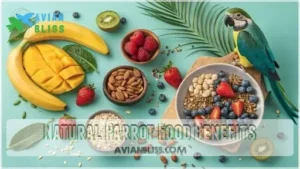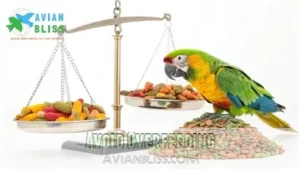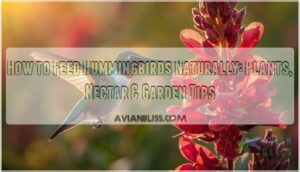This site is supported by our readers. We may earn a commission, at no cost to you, if you purchase through links.
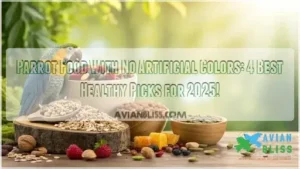
Instead, go for natural options packed with whole ingredients like grains, seeds, and dried fruits. Brands like Lafebers Nutri-Berries or Roudybush Daily Maintenance are great picks—your bird gets nutrients without the junk.
It’s like swapping chips for a fresh salad! Keep an eye on labels, though, as words like "natural" can be tricky. Want a peek at the healthiest choices? There’s more to learn about picking the best.
Table Of Contents
- Key Takeaways
- Natural Parrot Food Benefits
- Dangers of Artificial Colors
- Choosing Right Parrot Food
- Top 4 Parrot Food Options
- Healthy Parrot Food Options
- Feeding Parrots Balanced Diet
- Frequently Asked Questions (FAQs)
- What is the healthiest parrot food?
- What is Dr Harvey’s perfect parrot food?
- Should I give my parrot seed or pellets?
- What is the best food to feed parrots?
- How to choose the best bird food for parrots?
- Can a parrot eat chocolate?
- What is the best parrot & conure bird food?
- Which parrot food does not use corn?
- What is the healthiest food for parrots?
- What is the natural color of a parrot?
- Conclusion
Key Takeaways
- Avoid parrot foods with artificial colors like Red 40 and Yellow 5, as they can harm your bird’s health by causing allergies or DNA damage.
- Choose natural foods with whole ingredients like grains, seeds, fruits, and vegetables to keep your parrot healthy and free from harmful chemicals.
- Always read labels to ensure the food is free from artificial additives and offers a balanced mix of nutrients for vibrant feathers and strong immunity.
- Brands like Lafebers and Roudybush are great options for providing natural and nutritious diets without synthetic dyes.
Natural Parrot Food Benefits
Feeding your parrot natural food keeps them healthy and free from harmful chemicals. It’s packed with nutrients that support strong immunity, better digestion, and vibrant feathers.
Natural foods provide parrots with optimal health, boosting immunity, aiding digestion, and enhancing the brilliance of their feathers.
Rich in Vitamins and Minerals
Natural parrot food is packed with the vitamins and minerals your feathered friend needs for vibrant plumage and strong immune support.
These essential nutrients promote healthy development stages and keep your parrot thriving.
Choosing parrot food rich in natural mineral sources guarantees better vitamin absorption and overall parrot nutrition.
It’s like giving your bird a daily dose of nature’s best, with a balanced diet that includes formulated parrot diets, to guarantee the best for your pet, providing strong immune support and ensuring they receive the necessary nutrients for optimal health, which is key to a healthy development.
Promotes Healthy Digestive System
A great diet boosts your parrot’s digestion efficiency while supporting their gut microbiome.
Fiber-richness in natural parrot food keeps things moving smoothly.
Probiotic benefits help balance the good bacteria, and prebiotics fuel them.
Look for these key ingredients:
- Whole grains with fiber
- Fruits packed with natural enzymes
- Fresh vegetables
- Probiotic-rich pellets
- Leafy greens
The key to a healthy parrot is finding the right balance of nutrients, including probiotic benefits and prebiotic fuel for the good bacteria.
No Artificial Flavors or Preservatives
Artificial flavors and preservatives can mess with your parrot’s health. Synthetic additives might seem harmless but can stress their tiny systems.
Stick to natural alternatives like foods with real flavor origins. Reading labels helps you avoid preservative dangers. It’s about healthier parrots, free of synthetic dyes and artificial colors.
They’ll thank you with vibrant plumage and happy chirps!
| Risk | Artificial Additive | Safer Alternatives |
|---|---|---|
| Hypersensitivity | Synthetic dyes | Natural colorants |
| Weakened immunity | Chemical preservatives | Fresh, whole foods |
| Digestive issues | Artificial flavors | Freeze-dried fruits |
| Health deterioration | Flavor enhancers | Real vegetable blends |
| DNA damage | Synthetic chemicals | Organic-certified brands |
Dangers of Artificial Colors
Artificial colors in parrot food can harm your bird’s health by triggering allergic reactions or even damaging DNA.
Artificial colors in parrot food pose hidden risks, triggering allergies or DNA damage—choose natural options for a healthier, happier bird.
These dyes, like Red 40 and Yellow 5, aren’t just unnecessary—they could increase long-term health risks, making artificial colors a potential threat to your bird’s well-being.
Carcinogens and Hypersensitivity Reactions
Artificial colors in parrot food can expose birds to carcinogens, increasing cancer risk and weakening their immune system.
These harmful dyes, often loaded with parrot food harmful chemicals, may act as allergic triggers or cause hypersensitivity reactions.
DNA damage is another concern, leaving your pet vulnerable, which is why it’s crucial to opt for natural alternatives to guarantee a safer, healthier diet that protects your feathered friend.
Genotoxic Effects of Artificial Colors
Artificial colors in parrot food don’t just add brightness—they can harm parrots.
Studies link artificial coloring to genotoxic effects like DNA damage. Long-term, this means higher cancer risks and immune compromise.
Switch to dye-free brands for safety. Look for foods with these natural color alternatives:
- Air-dried vegetables
- Freeze-dried fruits
- Natural grains
- Organic seeds
- Vegetable-based pigments
This change can help ensure the safety of parrots by reducing exposure to harmful artificial colors.
Red 40, Yellow 6, Blue 1, Yellow 5
Artificial colors like Red 40, Yellow 6, Blue 1, and Yellow 5 are more than just pretty pigments—they can harm your parrot’s health.
Linked to coloring genotoxicity and hypersensitivity reactions, they may even compromise immunity.
Switching to natural alternatives or dye-free brands keeps your parrot safer.
Skip parrot food with artificial dyes and explore healthier, toxin-free options instead.
Choosing Right Parrot Food
You want your parrot to thrive, so choosing the right food is key.
Stick to options with natural ingredients and no artificial colors to keep your feathered friend healthy and happy.
Look for Natural Ingredients
Choosing parrot food with natural ingredients starts with reading labels.
Look for organic certifications, Non-GMO verification, and natural alternatives like fruits and grains. Avoid brands that skip ingredient transparency.
Parrot food with natural colors, not artificial dyes, keeps your bird healthier.
Consider various food ingredients for ideal parrot health. Think of it like picking fresh produce—clean, simple, and free of junk your feathered friend doesn’t need, focusing on complete concepts for better health.
Avoid Artificial Colors and Flavors
Skip flashy labels and focus on parrot food with natural colors and no artificial flavors.
Reading labels helps you spot dye-free benefits, avoiding Red 40 or Yellow 5.
Artificial colors and flavors may harm long-term health, while natural parrot food uses safe color sources like fruits or vegetables.
To confirm your parrot gets all necessary nutrients, consider high-quality pellet options.
Keep your parrot thriving with food that’s as wholesome as their wild diet, and provide them with a balanced diet for optimal health.
Check for Nutritional Balance
While avoiding artificial additives is smart, don’t overlook nutritional balance in parrot food.
Check for macronutrient ratios, quality protein, fiber content, and diverse vitamin and mineral sources.
A proper balanced diet includes well-rounded parrot food ingredients like natural grains, seeds, and vegetables.
Consider parrot dietary requirements for peak health.
Prioritize natural parrot food with clean labels to keep your bird healthy, active, and thriving.
Top 4 Parrot Food Options
You want the best for your parrot, and choosing the right food is a big part of that.
Here are four healthy options without artificial colors that keep your feathered friend happy and thriving.
1. Kaytee Fiesta Parrot Food 25lb Bag
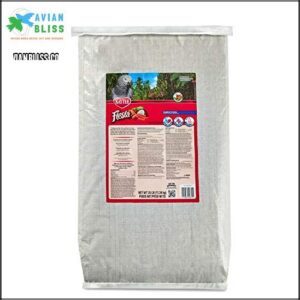
Kaytee Fiesta Parrot Food’s 25lb bag is a powerhouse blend featuring fruits, vegetables, nuts, and seeds designed for variety and nutrition.
Packed with Omega-3s and natural probiotics, it supports your parrot’s brain, heart, and digestive health.
This mix promotes vibrant feathers and keeps your bird active.
While the packaging includes a freshness guarantee, some buyers report dust in recent shipments.
It’s veterinarian-approved and suitable for parrots like African Greys.
Mix it with other foods for added variety and nutritional balance!
Best For: Parrot owners looking for a veterinarian-recommended, nutrient-rich food that supports their bird’s overall health and vibrant appearance.
- Packed with Omega-3s and probiotics for brain, heart, and digestive health.
- Includes a variety of fruits, vegetables, nuts, and seeds for balanced nutrition.
- Promotes vibrant feathers and skin health.
- Some customers report dust and chaff in recent shipments.
- Contains artificial colors which may raise health concerns for some buyers.
- Mixed reviews on pricing, with some finding it expensive compared to local options.
2. Lafebers Nutri Berries Bird Food
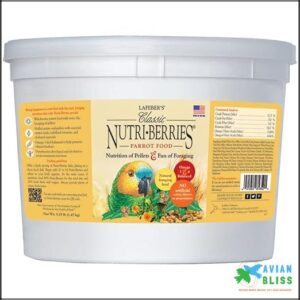
Lafebers Nutri Berries Bird Food shakes things up with its delicious, round shape that parrots love to play with.
It’s packed with hulled seeds, grains, and 16.5% pellets, all bound by wholesome ingredients.
Free from artificial colors, flavors, and preservatives, it supports your parrot’s immune system and keeps their feathers vibrant.
Designed to encourage foraging, it prevents boredom and feather picking.
Plus, it’s super versatile—use it as a complete diet or mix it with fresh fruits and veggies.
Best For: Parrot owners looking for a nutritious, engaging, and natural diet that encourages foraging behavior.
- Promotes healthy skin, feathers, and a strong immune system.
- Encourages natural foraging to prevent boredom and feather picking.
- Made with non-GMO, human-grade ingredients and no artificial additives.
- Contains corn-based ingredients which may not suit all birds.
- May not work well for birds unaccustomed to foraging behavior.
- The sweet coating might be too sticky for some feeding environments.
3. Roudybush Bird Food Daily Maintenance Medium
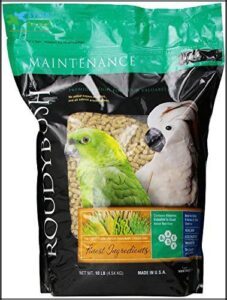
Roudybush Bird Food Daily Maintenance Medium offers a no-nonsense approach to keeping your parrot healthy.
With no artificial additives, it’s 100% edible, so there’s zero food waste. Made from balanced ingredients like ground corn and soybean meal, it’s enriched with essential vitamins and minerals for superior nutrition.
Designed by avian experts, this scientifically formulated food helps maintain digestive health and supports birds with unique dietary needs. Its medium-size pellets make eating easy and enjoyable, ensuring your feathered friend thrives every day.
This food provides high energy nutrition for vibrant feathers and alert behavior, making it an ideal choice for parrot owners who want to see their pets thrive every day.
Best For: Bird owners looking for a scientifically formulated, daily maintenance diet for their medium-sized feathered companions.
- 100% edible, reducing food waste.
- Enriched with essential vitamins, minerals, and natural flavors.
- Supports digestive health and is free from artificial additives.
- Limited to medium-sized pellets, which may not suit all bird types.
- Contains peanut meal, which may not be ideal for birds with specific allergies.
- Requires storage in a cool, dry place to maintain freshness.
4. ZuPreem Parrot Seed and Pellet Blend
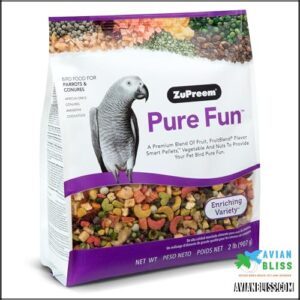
ZuPreem Parrot Seed and Pellet Blend combines nutrition and variety in every bite.
With premium seeds, natural FruitBlend pellets, and dried fruits and vegetables like peas and bananas, it’s a flavorful feast parrots love.
Free from artificial colors and flavors, it guarantees balanced nutrition for vibrant feathers and strong immunity.
This mix is perfect for picky eaters while minimizing waste with well-sized pieces, and the resealable bag keeps everything fresh.
It’s an easy, trustworthy pick for any parrot parent, making it a great choice for those seeking a reliable and trustworthy food option.
Best For: Parrot owners seeking a nutritious, flavorful, and balanced food option that caters to picky eaters.
- Combines natural seeds, pellets, and dried fruits for variety and nutrition.
- Free from artificial colors and flavors, promoting vibrant plumage and health.
- Resealable bag keeps food fresh and reduces waste.
- Higher price compared to other bird food options.
- Bag size might not be ideal for households with multiple birds.
- Occasional freshness concerns reported upon delivery.
Healthy Parrot Food Options
You want to keep your parrot healthy, and that starts with natural foods. By choosing fruits, vegetables, whole grains, and nuts, you’ll provide essential nutrients without harmful additives.
Fruits and Vegetables
Fruits and vegetables are key to natural parrot food, adding variety and essential nutrients.
Stick to safe produce like carrots, broccoli, and apples, prepared without added sugars or salt.
Avoid toxic produce such as avocado or onion.
A diverse range of vegetables guarantees a balanced nutrient intake.
Here’s a quick list:
- Sweet potatoes
- Bell peppers
- Spinach
- Blueberries
- Mango
Keep serving sizes small and fresh!
Whole Grains and Seeds
Adding whole grains and seeds to your parrot food supports great health and vibrant energy.
Grain nutritional value is high, offering fibers and vitamins, while seed variety keeps meals fun.
Sprouting benefits, like boosted nutrients, are icing on the cake.
Organic grains or wild birdseed mixes are best to mimic nature, consider parrot food grains for superior nutrition.
Your bird will love the variety!
Nuts and Proteins
Nuts are a fantastic protein source for parrots, but stick to safe nuts like almonds and walnuts.
These add nutritional value to parrot food and align with natural parrot food needs.
Avoid salted or flavored options, and prep by chopping into manageable pieces to prevent choking.
Monitor for allergy concerns and rotate protein sources for variety and balance—no artificial colors needed!
Feeding Parrots Balanced Diet
You’ve got to keep your parrot’s diet balanced to help it stay healthy and happy. Mix pellets, seeds, fruits, and vegetables to provide the variety and nutrients it needs.
Variety is Key
A good parrot diet is like a buffet—offer variety to keep them happy and healthy.
Rotate foods often to avoid boredom and cater to taste preferences.
Mix it up with:
- Seasonal fruits and veggies for freshness.
- Foraging enrichment like whole grains and seeds.
- Natural protein sources like nuts.
- Food presentation to encourage natural eating habits.
Avoid Overfeeding
Overfeeding parrots isn’t love—it’s a health risk.
Practice portion control to prevent obesity and meet their metabolic needs.
Monitor activity levels to adjust portions and avoid overstuffing.
Treats? Limit them to special occasions.
Use the table below for guidance:
| Parrot Size | Daily Pellets | Fresh Food | Treats | Activity Need |
|---|---|---|---|---|
| Small | ¼ cup | 2 tbsp | Rarely | High |
| Medium | ½ cup | ¼ cup | 1-2/wk | Medium |
| Large | 1 cup | ½ cup | Weekly | Low-medium |
| Extra-Large | 1½ cups | 1 cup | Weekly | Low |
Monitor Parrot’s Health
Keep an eye on your parrot’s wellbeing by watching for changes. A sudden shift in appetite or weight could signal trouble.
Check feather condition for signs of malnutrition. Dropping analysis helps track digestion. Behavioral changes like sluggishness aren’t normal.
Parrot health monitoring helps them thrive. Feed quality parrot food without artificial colors for the best parrot health food benefits. Stay observant!
- Spot Appetite Changes
- Watch for Weight Fluctuations
- Check Feather Condition
Frequently Asked Questions (FAQs)
What is the healthiest parrot food?
The healthiest parrot food combines natural pellets, seeds, fresh fruits, and vegetables.
Look for options free of artificial colors and additives.
Brands like ZuPreem Natural and TOP’s Parrot Food offer excellent nutrition for vibrant health.
What is Dr Harvey’s perfect parrot food?
You might think all parrot foods are alike, but Dr. Harvey’s stands out.
It’s packed with organic grains, seeds, fruits, and vegetables, free from artificial colors or preservatives.
Ensuring your parrot thrives naturally and happily.
Should I give my parrot seed or pellets?
You should give your parrot both seeds and pellets.
Pellets provide balanced nutrition, while seeds add variety.
Aim for 70% pellets and 30% fresh foods.
This keeps their diet balanced and their health thriving!
What is the best food to feed parrots?
Feed your parrot a mix of pellets, seeds, fresh fruits, and vegetables.
Choose brands like ZuPreem Natural or Lafeber Classic Avi-Cakes.
Avoid artificial colors, flavors, and preservatives to keep them healthy and thriving.
How to choose the best bird food for parrots?
Choosing parrot food is like finding the perfect playlist—variety matters.
Pick blends with natural ingredients, like seeds, pellets, fruits, and veggies.
Avoid artificial additives, check labels, consult experts, and consider your parrot’s unique dietary needs, which involves understanding the importance of natural ingredients.
Can a parrot eat chocolate?
Parrots should never eat chocolate.
It contains theobromine, which is toxic to birds and can cause seizures, heart issues, or even death.
Even small amounts are dangerous, so keep chocolate completely out of their diet.
What is the best parrot & conure bird food?
Holy guacamole, finding great bird food is essential.
Top picks include ZuPreem Natural, Roudybush Daily Diet, and Harrison’s Bird Foods.
They’re nutrient-packed, support health, and ditch artificial colors, keeping your feathered friend happy and vibrant.
Which parrot food does not use corn?
If you’re avoiding corn in parrot food, try brands like Roudybush Daily Maintenance or Dr. Harvey’s.
They focus on natural ingredients without fillers.
Always check labels to verify your parrot gets a balanced diet.
What is the healthiest food for parrots?
Healthy parrot food is natural, dye-free, and nutrient-packed.
Mix pellets, seeds, fresh vegetables, and fruits.
Avoid artificial additives, chocolate, and avocado.
Products like TOP’s Parrot Food or Roudybush Daily diets meet these needs brilliantly.
What is the natural color of a parrot?
A parrot’s natural color varies by species, ranging from vibrant greens to reds, blues, and yellows.
These colors help them blend into forests, making them both dazzling and perfectly suited for their wild habitats.
Conclusion
Making smart choices for your parrot’s diet isn’t just kind—it’s essential.
Parrot food with no artificial colors can keep your feathered friend healthy and happy, avoiding risks from synthetic dyes like Red 40.
Focus on natural ingredients packed with grains, seeds, and fruits for better nutrition.
Brands like Lafebers and Roudybush are excellent, but always read labels carefully.
Remember, a balanced diet is key to a long, vibrant life for your bird, and they’ll thank you with every chirp!

